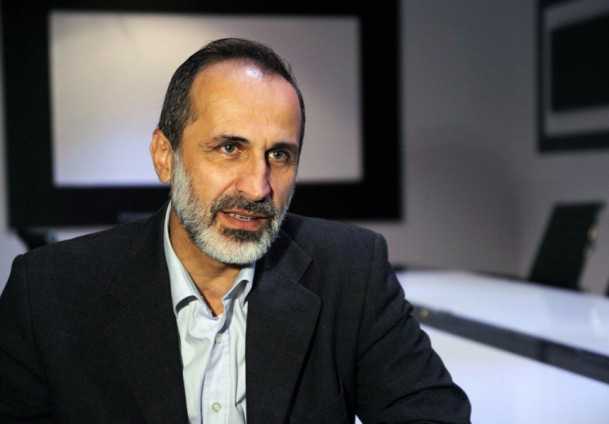Syria's opposition leader flew back to his Cairo headquarters from Germany on Sunday to explain to skeptical allies his decision to talk with President Bashar al-Assad's main backers Russia and Iran, Reuters reported.
The Russian and Iranian foreign ministers, and U.S. Vice-President Joe Biden, portrayed Syrian National Coalition leader Moaz Alkhatib's new willingness to talk with the Assad regime as a major step towards resolving the two-year-old war.
"If we want to stop the bloodshed we cannot continue putting the blame on one side or the other," Iran's Ali Akbar Salehi said on Sunday, welcoming Alkhatib's overtures and adding that he was ready to keep talking to the opposition. Iran is Assad's main military backer together with Russia.
"This is a very important step. Especially because the coalition was created on the basis of categorical rejection of any talks with the regime," Lavrov was quoted as saying on Sunday by Russia's Itar Tass news agency.
Russia has blocked three U.N. Security Council resolutions aimed at pushing Assad out or pressuring him to end a civil war in which more than 60,000 people have died. But Moscow has also tried to distance itself from Assad by saying it is not trying to prop him up and will not offer him asylum.
Syrian state media said Assad received a senior Iranian official and told him Syria could withstand "threats ... and aggression" like an air attack on a military base last week, which Damascus has blamed on Israel.
Politicians from the United States, Europe and the Middle East at the Munich Security Conference praised Alkhatib's "courage". But the moderate Islamist preacher was likely to face sharp criticism from the exiled leadership back in Cairo.
Alkhatib has put his leadership on the line by saying he would be willing to talk to representatives of the Assad regime on condition they release 150,000 prisoners and issue passports to the tens of thousands of displaced people who have fled to neighboring countries but do not have documents.
Walid al-Bunni, a member of the Coalition's 12-member politburo, described Alkhatib's meeting with Iran's foreign minister as a failure.
"It was unsuccessful. The Iranians are unprepared to do anything that could help the causes of the Syrian Revolution," Bunni, a former political prisoner, told Reuters from Budapest.
Bunni said the 70-member Coalition is preparing to convene in full in Cairo, to be briefed by Alkhatib on his latest diplomatic moves and meetings in Munich.
Alkhatib, whose family are custodians of the Umayyad Mosque in the historic center of Damascus, is seen as a bulwark against Salafist forces who are a main player in the armed opposition.
He was chosen as the head of the Coalition in Qatar last year, with crucial backing from the Muslim Brotherhood.
One of Alkhatib's colleagues on the Coalition politburo, speaking on condition of anonymity, pointed to comments by Salehi and Lavrov on Sunday, a day after their meetings with Alkhatib, as evidence that they still backed Assad.
Salehi told the Munich conference where the round of talks took place that the solution was to hold elections in Syria - making no mention of Assad having to leave the country.






